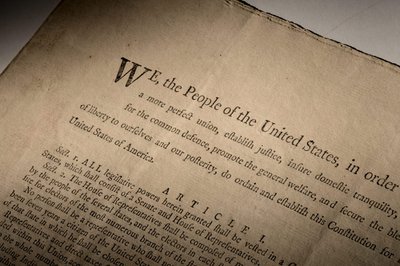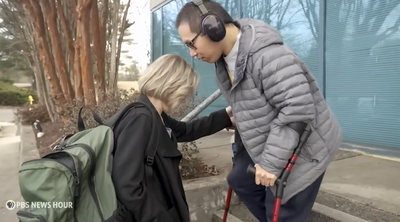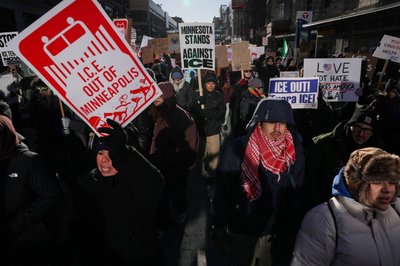NOTE: If you are short on time, watch the first part of the video (start to 3:23) and complete this See, Think, Wonder activity: What did you notice? What did the story make you think about? What would you want to learn more about?
SUMMARY
Over the last few days, President Donald Trump has repeatedly questioned the constitutional right to due process. His attacks come as the courts warn that the administration is exceeding the scope of his authority. White House correspondent Laura Barrón-López reports on the latest and Amna Nawaz discusses how the Trump administration is approaching due process with Georgetown law professor Steve Vladeck.
View the transcript of the story.
News alternative: Check out recent segments from the News Hour, and choose the story you’re most interested in watching. You can make a Google doc copy of discussion questions that work for any of the stories here.
Key terms
due process — "Due process is best defined in one word — fairness. Throughout U.S. history, its constitution, statutes and case law have provided standards for fair treatment of citizens by federal, state and local governments. The due process right, established by the Fourteenth Amendment, guarantees that the government cannot take a person’s basic rights to 'life, liberty or property, without due process of law.' The due process right is designed to protect citizens from actions taken by state government, counties, towns and cities." Source: Maine.gov
WARM-UP QUESTIONS
- Who are the individuals and groups featured in this story?
- What is due process?
- Where do you find the right to due process? What well-known U.S. document?
- Why do you think the Constitution (and the Supreme Court has confirmed) guarantees due process for citizens and noncitizens alike?
- How do the courts play a role in due process?
FOCUS QUESTIONS
- What do you make of Trump's response "I don't know" to the question as to whether or not he will uphold the Constitution?
- According to Steven Vladeck: "Due process is what allows the government to take extreme actions against us, with the faith that we are who the government says we are, with the faith that we actually fall into the category of people who can be arrested, who can be deported, who can be imprisoned. Without due process, then we're not living under the rule of law. We're living under the arbitrary whims of one person." How important is due process to democracy or a constitutional republic?
Media literacy: What follow-up questions would you have asked Trump in the Meet the Press interview clip you saw here? What questions do you have for law professor Steven Vladeck?
WHAT STUDENTS CAN DO
Learn about due process by reading more below about the two types of due process, procedural due process and substantive due process. According to Maine.gov:
"Due process of law involves two types of processes: (a) procedural due process – Is the process fair? and (b) substantive due process - Does the government have the right to bring the action in the first place?"
The article goes on to say:

An extremely rare official first-edition printed copy of the U.S. Constitution as adopted by delegates to the Constitutional Convention in Philadelphia in 1787, which will auctioned off in mid-November 2021 by Sotheby’s in New York, is seen in this handout image provided by Sotheby’s. Courtesy of Sotheby’s/Handout via REUTERS ATTENTION EDITORS - THIS IMAGE WAS PROVIDED BY A THIRD PARTY. MANDATORY CREDIT. NO RESALES. NO ARCHIVES.
"Due process procedures do not guarantee that the result of a government action will be to a citizen's liking. However, fair procedures do help prevent arbitrary, unreasonable decisions.
Due process includes two things: (1) Was adequate notice given? Due process requirements vary depending on the situation. At a minimum, due process means that a citizen who will be affected by a government decision must be given advance notice of what the government plans to do and how the government’s action may deprive them of life, liberty, or property."
Now, when you hear about due process on the news or in school, you will have a better idea of what it is. But how about more specific examples? Those always help understand a legal or constitutional term better. Check the website, Justia about U.S. Supreme Court cases involving due process. Scroll through the list of cases. Are there any cases that surprised you or you'd like to learn more about? Keep in mind that due process is a constitutional right at the local and state levels as well.
Fill out this form to share your thoughts on Classroom’s resources.





